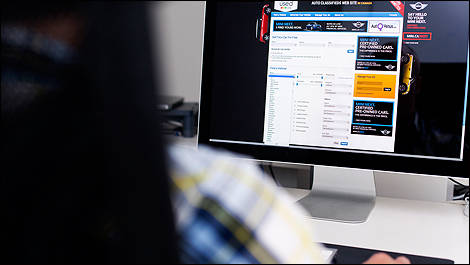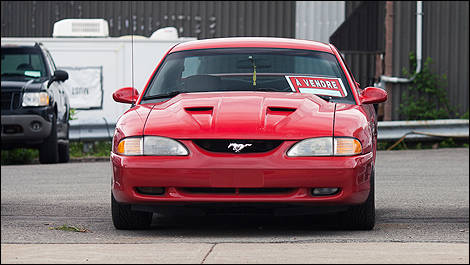Spring is right around the corner, and this might be your year to send the winter blahs packing by investing in a new sports car. Whether you’re considering a high-dollar, high-powered roadster or something more sensible and attainable a few general tips should be kept front-of-mind in the shopping process to protect yourself from potential issues surrounding that sports-car buy. Some of the most important are outlined below.
Online Owner Forums
Online owner forums are virtual communities where owners of a certain type of vehicle gather to share stories, ideas, photos, and experiences about their rides. Most sports car models have numerous owner forums available on the web, and most of these feature articles and discussions about reliability and common issues.
Check to see if that’s the case for the model you’re considering. Sports car shoppers may also want to browse forums to look for more information or create an account and post a topic asking specific questions of concern.
Signing up for an owner forum and introducing yourself as a potential buyer for the model in question takes only a few minutes and can put you in touch with hundreds of helpful folks with experience on the model in question
Convertible
Is the sports car you’re considering a convertible? If so, check the area where the roof is stored as well as the vehicle’s carpeting and seats for signs of moisture damage. Unwelcomed moisture can make your convertible smell like a musty gym bag, and can cause rust and mold. Be sure to open and close the top several times, noting any unwelcome binding or signs of top motor trouble.
Modifications
Many used sports cars will have been modified to enhance their looks, power and performance. Modifications like intake and exhaust systems and wheels are typically safe so long as the quality of the parts and installation work is up to par.
Other modifications like nitrous, altered engine management software, modified lighting, and lowered suspension can be problematic or even illegal. To be safe, avoid a sports car with extensive modifications unless you’re familiar with the vehicle and modifications in question.
Suspension
In some sports cars, the use of lower ride height and stiffer suspension calibrations mean certain components can take a serious beating in locales with rough roads. Have a mechanic inspect the suspension on the model you’re considering checking for leaky shock absorbers, worn-out bushings, alignment issues, and busted-up ball-joints.
While the car is in the air, a check of the steering system, as well as an inspection for any leaks, can be carried out, too.
Turbocharger
Turbochargers are a unique and pleasing bit of hardware designed to increase driving pleasure by boosting engine power output. For that reason, many popular used sports car models (Mitsubishi Evolution, Subaru WRX STI, Volkswagen GTI, Pontiac Solstice, Mitsubishi Eclipse, Toyota MR2, Nissan Skyline, etc.) are turbocharged. With proper maintenance and care, a turbocharger should last the life of the vehicle in question.
Be sure the turbocharged model you’re considering has been treated to frequent, on-time, high-quality oil changes. These are vital to long-term turbo health. Also, be sure the model you’re considering hasn’t had its turbocharger modified to generate higher boost than the factory intended, as this can damage the turbocharger and other components. A “Turbo Timer,” which lets the engine run a moment or two after being switched off, is a good thing as it cools the turbocharger down more slowly.
Signs of a bad turbo include smoke (particularly at idle when the engine is warm), sporadic performance under hard acceleration, and oil leaks out of the turbo housing possibly into the “charge pipes.” Have these removed and check for pools of dirty oil, and also note excessive “play” in the shaft of the turbocharger. Seek a mechanic’s help if you’re not sure how to perform these checks.
Consumables
By their nature, a sports car is likely to have been driven harder than a family sedan or minivan. To be sure the model you’re considering wasn’t owned by an aspiring parking-lot drift champion or street-racer extraordinaire, pay special attention to consumable parts: tires, brakes and the clutch (if equipped).
Be sure the seller isn’t trying to pass on an expensive replacement bill. If the brake pads and tires are chewed up more than your Rottweiler’s rawhide, call it into pricing negotiations.
Fluids/State of Tune
Fluids are the life blood of any vehicle, and attention to their maintenance requirements is arguably the single most important thing an owner can do to encourage long-term life from their car. Check the condition and level of the engine oil, coolant and transmission fluid on the model you’re considering as outlined in the owner’s manual. If you’re not sure how, take the car in question to its dealership for a pre-purchase inspection.
Electronics
The newer the vehicle you’re considering, the more electronics it uses. Electronics are great -- until they start acting up. Be sure all electronic accessories in the used sports car you’re considering work properly, and that no warning lights or messages are illuminated in the instrument cluster. Note that not all driveline electronics issues cause a warning message to be displayed. A “scan” of the vehicle’s computer brain can reveal any hidden problems.
Online Owner Forums
Online owner forums are virtual communities where owners of a certain type of vehicle gather to share stories, ideas, photos, and experiences about their rides. Most sports car models have numerous owner forums available on the web, and most of these feature articles and discussions about reliability and common issues.
Check to see if that’s the case for the model you’re considering. Sports car shoppers may also want to browse forums to look for more information or create an account and post a topic asking specific questions of concern.
Signing up for an owner forum and introducing yourself as a potential buyer for the model in question takes only a few minutes and can put you in touch with hundreds of helpful folks with experience on the model in question
 |
| Photo: Sébastien D'Amour |
Convertible
Is the sports car you’re considering a convertible? If so, check the area where the roof is stored as well as the vehicle’s carpeting and seats for signs of moisture damage. Unwelcomed moisture can make your convertible smell like a musty gym bag, and can cause rust and mold. Be sure to open and close the top several times, noting any unwelcome binding or signs of top motor trouble.
Modifications
Many used sports cars will have been modified to enhance their looks, power and performance. Modifications like intake and exhaust systems and wheels are typically safe so long as the quality of the parts and installation work is up to par.
Other modifications like nitrous, altered engine management software, modified lighting, and lowered suspension can be problematic or even illegal. To be safe, avoid a sports car with extensive modifications unless you’re familiar with the vehicle and modifications in question.
Suspension
In some sports cars, the use of lower ride height and stiffer suspension calibrations mean certain components can take a serious beating in locales with rough roads. Have a mechanic inspect the suspension on the model you’re considering checking for leaky shock absorbers, worn-out bushings, alignment issues, and busted-up ball-joints.
While the car is in the air, a check of the steering system, as well as an inspection for any leaks, can be carried out, too.
Turbocharger
Turbochargers are a unique and pleasing bit of hardware designed to increase driving pleasure by boosting engine power output. For that reason, many popular used sports car models (Mitsubishi Evolution, Subaru WRX STI, Volkswagen GTI, Pontiac Solstice, Mitsubishi Eclipse, Toyota MR2, Nissan Skyline, etc.) are turbocharged. With proper maintenance and care, a turbocharger should last the life of the vehicle in question.
Be sure the turbocharged model you’re considering has been treated to frequent, on-time, high-quality oil changes. These are vital to long-term turbo health. Also, be sure the model you’re considering hasn’t had its turbocharger modified to generate higher boost than the factory intended, as this can damage the turbocharger and other components. A “Turbo Timer,” which lets the engine run a moment or two after being switched off, is a good thing as it cools the turbocharger down more slowly.
Signs of a bad turbo include smoke (particularly at idle when the engine is warm), sporadic performance under hard acceleration, and oil leaks out of the turbo housing possibly into the “charge pipes.” Have these removed and check for pools of dirty oil, and also note excessive “play” in the shaft of the turbocharger. Seek a mechanic’s help if you’re not sure how to perform these checks.
Consumables
By their nature, a sports car is likely to have been driven harder than a family sedan or minivan. To be sure the model you’re considering wasn’t owned by an aspiring parking-lot drift champion or street-racer extraordinaire, pay special attention to consumable parts: tires, brakes and the clutch (if equipped).
Be sure the seller isn’t trying to pass on an expensive replacement bill. If the brake pads and tires are chewed up more than your Rottweiler’s rawhide, call it into pricing negotiations.
Fluids/State of Tune
Fluids are the life blood of any vehicle, and attention to their maintenance requirements is arguably the single most important thing an owner can do to encourage long-term life from their car. Check the condition and level of the engine oil, coolant and transmission fluid on the model you’re considering as outlined in the owner’s manual. If you’re not sure how, take the car in question to its dealership for a pre-purchase inspection.
Electronics
The newer the vehicle you’re considering, the more electronics it uses. Electronics are great -- until they start acting up. Be sure all electronic accessories in the used sports car you’re considering work properly, and that no warning lights or messages are illuminated in the instrument cluster. Note that not all driveline electronics issues cause a warning message to be displayed. A “scan” of the vehicle’s computer brain can reveal any hidden problems.
 |
| Photo: Sébastien D'Amour |


